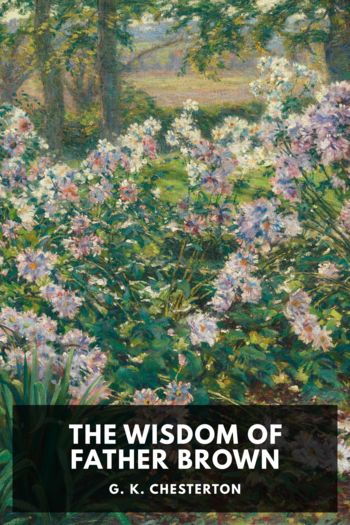The Club of Queer Trades - G. K. Chesterton (highly recommended books .txt) 📗

- Author: G. K. Chesterton
Book online «The Club of Queer Trades - G. K. Chesterton (highly recommended books .txt) 📗». Author G. K. Chesterton
One of the most interesting of Basil’s motley group of acquaintances was Professor Chadd. He was known to the ethnological world (which is a very interesting world, but a long way off this one) as the second greatest, if not the greatest, authority on the relations of savages to language. He was known to the neighbourhood of Hart Street, Bloomsbury, as a bearded man with a bald head, spectacles, and a patient face, the face of an unaccountable Nonconformist who had forgotten how to be angry. He went to and fro between the British Museum and a selection of blameless teashops, with an armful of books and a poor but honest umbrella. He was never seen without the books and the umbrella, and was supposed (by the lighter wits of the Persian MS. room) to go to bed with them in his little brick villa in the neighbourhood of Shepherd’s Bush. There he lived with three sisters, ladies of solid goodness, but sinister demeanour. His life was happy, as are almost all the lives of methodical students, but one would not have called it exhilarating. His only hours of exhilaration occurred when his friend, Basil Grant, came into the house, late at night, a tornado of conversation.
Basil, though close on sixty, had moods of boisterous babyishness, and these seemed for some reason or other to descend upon him particularly in the house of his studious and almost dingy friend. I can remember vividly (for I was acquainted with both parties and often dined with them) the gaiety of Grant on that particular evening when the strange calamity fell upon the professor. Professor Chadd was, like most of his particular class and type (the class that is at once academic and middle-class), a Radical of a solemn and old-fashioned type. Grant was a Radical himself, but he was that more discriminating and not uncommon type of Radical who passes most of his time in abusing the Radical party. Chadd had just contributed to a magazine an article called “Zulu Interests and the New Makango Frontier,” in which a precise scientific report of his study of the customs of the people of T’Chaka was reinforced by a severe protest against certain interferences with these customs both by the British and the Germans. He was sitting with the magazine in front of him, the lamplight shining on his spectacles, a wrinkle in his forehead, not of anger, but of perplexity, as Basil Grant strode up and down the room, shaking it with his voice, with his high spirits and his heavy tread.
“It’s not your opinions that I object to, my esteemed Chadd,” he was saying, “it’s you. You are quite right to champion the Zulus, but for all that you do not sympathize with them. No doubt you know the Zulu way of cooking tomatoes and the Zulu prayer before blowing one’s nose; but for all that you don’t understand them as well as I do, who don’t know an assegai from an alligator. You are more learned, Chadd, but I am more Zulu. Why is it that the jolly old barbarians of this earth are always championed by people who are their antithesis? Why is it? You are sagacious, you are benevolent, you are well informed, but, Chadd, you are not savage. Live no longer under that rosy illusion. Look in the glass. Ask your sisters. Consult the librarian of the British Museum. Look at this umbrella.” And he held up that sad but still respectable article. “Look at it. For ten mortal years to my certain knowledge you have carried that object under your arm, and I have no sort of doubt that you carried it at the age of eight months, and it never occurred to you to give one wild yell and hurl it like a javelin—thus—”
And he sent the umbrella whizzing past the professor’s bald head, so that it knocked over a pile of books with a crash and left a vase rocking.
Professor Chadd appeared totally unmoved, with his face still lifted to the lamp and the wrinkle cut in his forehead.
“Your mental processes,” he said, “always go a little too fast. And they are stated without method. There is no kind of inconsistency”—and no words can convey the time he took to get to the end of the word—“between valuing the right of the aborigines





Comments (0)